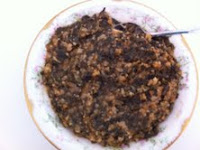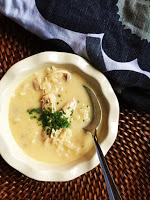
Our pantry and diets have little room these days for unhealthy fats. Olive oil takes center stage, with guest appearances by canola, peanut and sesame. Ingredient labels are scutinized, and meats are trimmed with ruthless zeal.
I wonder what my mother would think?
As I’ve mentioned, Mom started preparing just about every meal by browning onions in butter — real butter, the salty kind. She rejected oil of any sort with a typical Armenian flip of the hand. “It just doesn’t taste the same,” she’d say.
Of course, she was right: Butter tastes great! That’s the reason so many famous chefs dump gobs of butter into every sauce and soup — and probably even salad when nobody’s looking.
Butter does have one major limitation in cooking: It burns at a relatively low temperature. So for heavy-duty applications, Mom never hesitated to use what a cardiologist nowadays would probably consider the nuclear option: Yiugh.
Yiugh (Yoogh?) is Armenian for fat or oil. In our kitchen, it meant flank fat rendered in a giant pot, sweetened with an apple or quince and skimmed until it was as clear as rain water. The ritual always coincided with the making of kavourma, lamb cooked until it was nearly soft as butter, salted and plunged into the freshly rendered yiugh.
When the fat cooled and solidified, it formed an air-tight seal around the lamb which, along with the heavy dose of salt, helped preserve the meat. The technique is similar to confit, which the French imagine they invented.
The kavourma was always stored in a heavy, earthen crock that appeared to hold a couple of gallons of yiugh. It could be kept on the back porch in winter, or in the fridge any time. One of the great treats of my childhood was opening the crock and cracking through the thick layer of white fat on top with a fork, then pulling out a fat, salty slab of meat. It was sort of like ice fishing for lamb!
There is nothing that compares to kavourma and eggs for breakfast, unless it’s kavourma and bulgur for dinner.
And there is truly nothing to compare with yiugh as a frying medium. It withstood heat so well they probably should have just slathered the space shuttle with it instead of fiddling with those tiles. You like golden, crispy French fries? They came out perfect every time — and never greasy.
That’s the thing: Yiugh sealed in the taste without soaking into the food. At least, that’s how I like to remember it, and memories are all I’m going to have of yiugh and karvourma along with any number of wonderful foods of my youth.
In the Old Country, fat was considered an essential part of the winter diet — and preserving meat by any means was vital. Now, well…maybe we know too much, or we have life too easy to have the patience for such things.
Either way, we won’t be making kavourma any time soon. I guess I’d rather wallow in nostalgia than wallow in fat.
I wonder what my mother would think?
As I’ve mentioned, Mom started preparing just about every meal by browning onions in butter — real butter, the salty kind. She rejected oil of any sort with a typical Armenian flip of the hand. “It just doesn’t taste the same,” she’d say.
Of course, she was right: Butter tastes great! That’s the reason so many famous chefs dump gobs of butter into every sauce and soup — and probably even salad when nobody’s looking.
Butter does have one major limitation in cooking: It burns at a relatively low temperature. So for heavy-duty applications, Mom never hesitated to use what a cardiologist nowadays would probably consider the nuclear option: Yiugh.
Yiugh (Yoogh?) is Armenian for fat or oil. In our kitchen, it meant flank fat rendered in a giant pot, sweetened with an apple or quince and skimmed until it was as clear as rain water. The ritual always coincided with the making of kavourma, lamb cooked until it was nearly soft as butter, salted and plunged into the freshly rendered yiugh.
When the fat cooled and solidified, it formed an air-tight seal around the lamb which, along with the heavy dose of salt, helped preserve the meat. The technique is similar to confit, which the French imagine they invented.
The kavourma was always stored in a heavy, earthen crock that appeared to hold a couple of gallons of yiugh. It could be kept on the back porch in winter, or in the fridge any time. One of the great treats of my childhood was opening the crock and cracking through the thick layer of white fat on top with a fork, then pulling out a fat, salty slab of meat. It was sort of like ice fishing for lamb!
There is nothing that compares to kavourma and eggs for breakfast, unless it’s kavourma and bulgur for dinner.
And there is truly nothing to compare with yiugh as a frying medium. It withstood heat so well they probably should have just slathered the space shuttle with it instead of fiddling with those tiles. You like golden, crispy French fries? They came out perfect every time — and never greasy.
That’s the thing: Yiugh sealed in the taste without soaking into the food. At least, that’s how I like to remember it, and memories are all I’m going to have of yiugh and karvourma along with any number of wonderful foods of my youth.
In the Old Country, fat was considered an essential part of the winter diet — and preserving meat by any means was vital. Now, well…maybe we know too much, or we have life too easy to have the patience for such things.
Either way, we won’t be making kavourma any time soon. I guess I’d rather wallow in nostalgia than wallow in fat.
(Visited 207 times, 1 visits today)




My mother still remembers HER mom making "yakhneli kufteh" (meatball stew) with bits of temag (lardon) in the middle of each meatball. And there are of course many other recipes that require either butter, clarified butter, or some form of fat.
My grandmother also made grape leaves by placing a whole lamb's head in the middle of the pot, lining up the stuffed grape leaves in a wheel around the head, and interspersing lamb's tongues between every two or three layers. Cholesterol city, here we come!
Those were the days… And they all lived to be 103!
I think, if you remember the comics of my day, it was 130. "Armenian herder still works long day at 136" was a typical feature. Maybe it was the mountain air. We were always told it was yogurt. Not that we ever experienced yogurt. Unless it came in tin foil like Jiffy Pop, we did not experience it. We thought it might not be worth living so long if you had to eat a food that started with a "Y."
Don't forget the "turchoug hatz." When the Kavourma was ready, slices of what we called Armenian Bread (round with the hole in the middle) was immersed in the fat, then squeazed to remove the excess fat back into the galvanized tub, and eaten with morsels of meat, the fried quince and apple.
Oh yes, the hatz! We would buy it directly from "Hatz Baboog" who made house calls with his unbelievebale assortment of breads! YUM!
Oh kavourma!! My daughter's FAVORITE!!! I have some in the freezer! I myself have a hard time eating it because of all the yoogh in it but she just loves it! Thanks for reminding me to take it out and let her enjoy it! Oh the things we can eat when we are young!